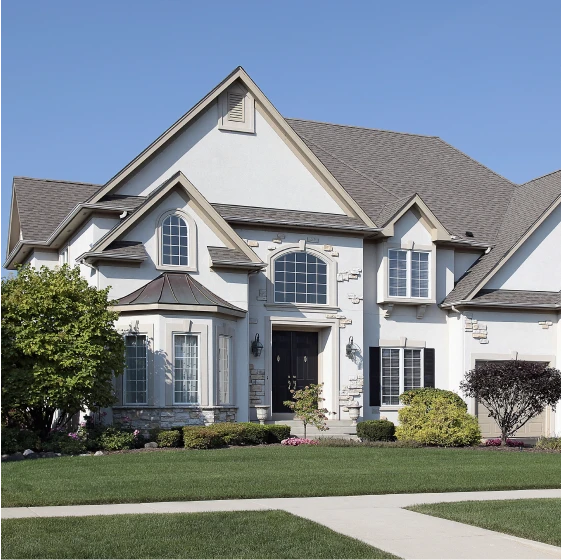First time
home buyer?
Buying your first home is an exciting milestone, but it can also feel overwhelming with all the choices and information at your disposal. Since this is one of the biggest purchases you’ll make, it’s essential to do your research and be well-prepared before beginning the process. A critical first step is determining how much mortgage you can comfortably afford, which will help define your home search price range.
An advantage of working with an Uptown mortgage agent is they will help you examine your monthly debt to income ratio to generate a realistic monthly mortgage payment that will not alter your current lifestyle They’ll help you assess your debt-to-income ratio to calculate a manageable monthly mortgage payment that fits your lifestyle. Ideally, your total housing expenses—including mortgage payments, utilities, and heating—should not exceed 39% of your gross income. Additionally, your debt payments should remain below 44% of your monthly income. If you’re considering buying a condo, don’t forget to account for condo fees in your budget.
One of the biggest challenges for first-time buyers is saving for a down payment and the additional costs that come with purchasing a home. The more you save for a down payment, the easier it becomes to secure a mortgage. Fortunately, there are various government incentives available for first-time buyers in Canada that can help you save a significant amount of money.

In Ontario, real estate prices tend to be higher, which means your down payment will likely be larger. The down payment is the upfront cash amount you put toward buying your home, with the rest being financed through a mortgage. Here’s how it works:
Purchase Price
Amount of Down Payment
Example:
If you’re buying a home priced at $800,000, your down payment would be broken down as follows:
= $25,000
= $30,000
= $25,000
= $30,000
would be $55,000
As a first-time homebuyer in Canada, there are several government programs and incentives available to help make buying your home more affordable. Here’s a breakdown of the key programs:
RRSP Home Buyer’s Plan (HBP)
The Home Buyer’s Plan (HBP) allows you to withdraw up to $60,000 from your Registered Retirement Savings Plan (RRSP) to put toward your down payment. If you’re buying as a couple
First-Time Home Buyers’ Tax Credit (FTHB)
The First-Time Home Buyers’ Tax Credit provides a $5,000 non-refundable tax credit to help offset closing costs, such as legal fees. This
credit can offer up to $750 in federal tax savings. The credit is claimed when filing your tax return and is available to individuals purchasing their first home.
GST/HST New Housing Rebate
If you are buying a new home or completing significant renovations, you may qualify for a rebate on part of the GST or HST paid on the purchase or renovation. This rebate
is applicable to newly built homes, substantial renovations, or homes built on land you already own. The rebate is only available for homes that will serve as primary residences.
Mortgage Default Insurance (CMHC Insurance)
Also known as CMHC insurance, this is mandatory for buyers who have a down payment of less than 20%. The insurance protects lenders in the eve
nt of default, allowing buyers with smaller down payments to qualify for a mortgage. The premium is based on the size of your down payment and is typically added to your mortgage payments rather than being paid upfront.
Land Transfer Tax Rebate
First-time homebuyers in Ontario are eligible for a rebate on the Land Transfer Tax (LTT), offering up to $4,000. If you’re purchasing in the City of Toronto, you may qualify for
an additional rebate of up to $4,475 on the municipal land transfer tax. You must apply for the rebate at the time of registration or filing.


When purchasing your home, it’s important to plan for closing costs. Here are some common expenses you should budget for:
Land Transfer Tax: Calculated as a percentage of your home’s purchase price.
Legal Fees: Expect to pay around $1,500 for legal documentation.
Title Insurance: Protects you against ownership disputes, costing approximately $200.
Title Insurance: Protects you against ownership disputes, costing approximately $200.
CMHC Insurance: Required for down payments under 20%.
Home Inspection (Optional): A highly advisable step costing around $500 to ensure there are no hidden issues with the home.
First-Time Homebuyers
When purchasing your first home, it’s essential to separate your wants from your needs. While features like a pool or gazebo might be nice-to-haves, practical considerations—such as the number of bedrooms, proximity to work, and school districts—should come first. Here are some key questions to guide your decision:
How long do I plan to stay in this house?
Can I comfortably afford this home?
Which neighborhood aligns with my lifestyle and commute?
Does the house provide room for future growth?
Does the house provide room for future growth?
Is public transit easily accessible?
What’s the daily commute to work like?
How are the local schools rated?
Do I prefer a new home or an older one?
Feeling ready to buy a home? By following these tips, you’ll avoid common mistakes and ensure the process goes smoothly from start to finish. Now that you’re informed and pre-approved, it’s time for the fun part—home shopping! With a clear budget and pre-approval, you can confidently search for homes in your price range, minimizing the risk of falling in love with a home that’s beyond your means. We’re here to help you find your dream home when you’re ready!
You will need proof of income, a good credit score, a down payment, a list of assets and liabilities, and government issued identification.
Yes, getting pre-approved is recommended. It shows sellers you are a serious buyer and helps you understand your budget.
Owning a home builds equity over time, whereas renting is often considered paying someone else’s mortgage.
While not required, a home inspection is highly recommended to identify any potential issues before purchasing.
Home insurance is required by most lenders and protects your investment from damage and unforeseen events.
From the start of the application to the closing date of the home, it can typically take anywhere from 20-60 days, depending on the complexity of the transaction.
While it may be more difficult, there are mortgage products available for those with lower credit scores or smaller down payments.
Your mortgage payments will typically cover the loan principal, interest, property taxes, and insurance (if applicable).
You will need proof of income, identification, a credit report, and documents outlining your assets and liabilities.
A fixed mortgage has a set interest rate for the term of the loan, while a variable mortgage’s rate fluctuates with the market.
